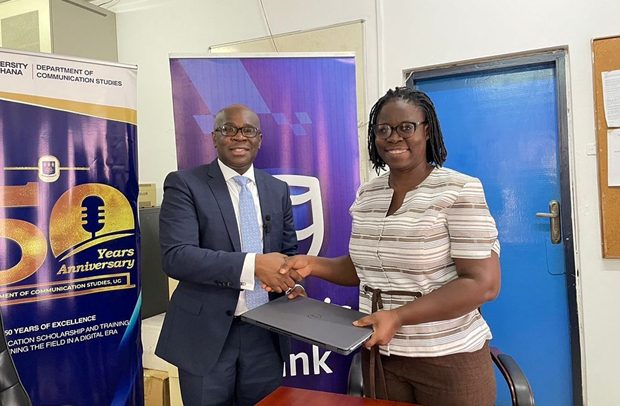Kwamina Asomaning presenting the laptop to the Head of Department of Communication Studies, Abena Animwaa Yeboah-Banin
Stanbic Bank Ghana as part of efforts to encourage, promote and deliver improved Science, Technology, Engineering and Maths education (STEM) in the country has donated 50 laptops to the University of Ghana.
This is in line with the bank’s commitment to help Ghana harness the opportunities of the fourth industrial revolution by partnering and creating relevant, episodic initiatives aimed at equipping the next generation of workers with the necessary competencies.
Chief Executive of Stanbic Bank, Kwamina Asomaning who presented the laptops on behalf of the bank noted that the bank’s purpose, brand promise, and the digitization & innovation pillars of their strategy, make STEM (for girls) a natural fit and an area meriting special focus and investment.
He said, “Stanbic Bank Ghana is committed to adding value to key development levers, one of which is education. That is why we continue to partner with like-minded institutions to support needy students who have gifted learning capacity and provide them with basic support tools.”
Vice Chancellor of the University of Ghana, Prof. Nana Aba Appiah Amfo, expressed gratitude to the Stanbic team for their support.
She said, “Digital skills are critical skills graduates need in today’s world to maximize their potential, make them employable and succeed in the world of work. So far, we have received a total of 75 laptops from Stanbic under this One Student One Laptop 1S1L initiative,” she added
Stanbic donated (40) laptops in support of the Vice Chancellors’ One Student One Laptop (1S1L) initiative and Ten (10) laptops to the Department of Communication Studies.
About 6,000 students are expected to benefit from this 1S1L initiative, which forms part of the Vice Chancellor’s strategic vision of enhancing the University of Ghana students’ experience through digitalization, seeks to make it possible for every student at the university to be able to access online resources, irrespective of their socio-economic backgrounds.
BY Prince Fiifi Yorke


